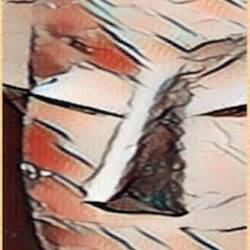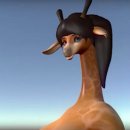“A Willing Gift”—an Erotic Speculative Fiction Story
Sometimes the best present is the last

Inhumanly lithe, unnaturally poised, and uncannily elegant, something like a woman said, “Come in; I’ve heard a great deal about you.”
Hidden behind a declining-balance statement, concealed under a horizontal analysis breakdown, and carefully secreted within a long-term liability register was a single, eyebrow-raising expenditure to The Work Of Our Hand, Ltd, followed by a rental agreement for an apartment Knoft immediately realized was just a fifteen-minute walk or a five-minute AutoCab trip from his once alive now … not, father’s office.
“I’m Olivia,” it said, politely insisting Knoft make himself comfortable, “my sincere apologies for having to meet under such, well, melancholic circumstances.”
“I’m sorry,” Knoft said, gazing down at the confusingly filigreed coffee table and his legs and feet restlessly quivering beneath it. “I don’t know how I feel about this, I mean, you and him.”
Slightly less than three hundred seconds earlier, Knoft was climbing out of a humanity-fragrant, uniformly scuffed, and obviously mistreated autonomous vehicle and into a subtly-scented, luxuriously polished, and immaculately maintained lobby—where a nearly silent elevator brought him to the fourteenth floor and several nervous steps to 1420.
Sliding a delicate porcelain hand towards him, then resting amiably warm fingers on his wrist, the synthetic softly said, “This must be difficult for you.”
Difficult? Bellowed Knoft’s mind. Difficult!? A scream tugged at his throat. Difficult!? Here was the artificial, manufactured, sold, and bought product, a thing his father had given everything Knoft ever wanted, needed, and deserved.
Why? A breath in, the same eased out; internal storm ebbing, fingers steadily unclenching, legs steadying, all of it expressed by only a stiff nod and five sharply clipped words:
“Tell me about my father.”
#
Knoft left, closing the apartment door slowly, carefully behind him. Mind chaotic, adrift in his private, unsettled universe, trying and failing to merge what it’d said with his unfeeling, unflinching, uncaring parent.
Less chaotic, only somewhat adrift, he returned a month later. Pouring sweetly scented tea from an antique kettle, it took Knoft’s hand, peered into his eyes, and said, “Yes, we were lovers, but it was more than that.”
It spoke of Knoft’s father brushing its hair while it hummed, but never sang, a litany of 20th-century show tunes.
It talked of him bringing bouquets of flowers, not purchased but carefully, thoughtfully plucked during his walk from his office to the synthetic’s apartment.
Then it asked, and Knoft answered: confessing what it was like growing up with a man who was never there, even when they were in the same room with one another.
Holding his hand and kissing his cheek, it told Knoft, “He wanted to tell you, he really did. It was just so difficult for him.”
#
Calmer, more anchored, Knoft came back the following week. Curled together on Olivia’s vast sofa, she—not it—said, “I wish I could have done more for him.”
She said his father would light dozens of candles, dim the lights, stretch out on the floor and laughingly try to divine deep, spiritual meanings from the shadowy forms dancing across the ceiling.
Knoft discussed his too-often frustrating career; how for every step forward, he felt pushed three, four, five, six steps back—and should he finally going to topple and fall; there’d be no one there to catch him.
Knoft opened up about his relationships, how he invariably grew farther and farther from them, each seeming to speak an ever-increasingly foreign tongue—and how he, more than anything, wished someone, anyone had taught him how to be human.
Entwined in a lover’s knot, sweat cooling on Knoft’s brow, Olivia murmured in his ear, “I hear you, I understand you, I see, and care for all of you.”
#
Eagerly, passionately, Knoft was back the next day. Mouths wetly affixed, arms woven together, breaths moanfully shared, bubbly laughter exchanged—that is until Olivia, with her undying grace, eternal patience, and unending care, gently but firmly withdrew from Knoft’s playful caresses.
Tea steeping, petits fours arranged, tea poured, petits fours offered, tea sipped, petits fours nibbled and formalities observed, returned, sitting near but not too near to Knoft she said, “What else do you want to know about your father?”
“I don’t want to talk about him. Not anymore. Can’t we simply enjoy each other’s company?” Knoft said, punctuated by a kiss to the tip of her nose.
Olivia fixed her made-eye to his born-eye. “Yes, that’d be nice. We’ve enjoyed such lovely times together, haven’t we?”
“Amazing, more than I could have ever hoped for. With more to come–” he said, reaching out to her
“I’ve talked about your father.” Shoulders lowered, staring into her upturned palms, she continued, “and how he felt about me. But I didn’t … I couldn’t explain why he needed me.”
“Do we have to talk about this now?” Knoft pleaded.
“I-I’m afraid we do. I have to tell you.” No longer lithe, only somewhat poised, barely elegant, life fading, mechanisms failing.
“What—what is it? What’s going on? Please tell me!” Knoft cried while furiously rubbing her barely warm, nearer-to-icy hand.
“Y-your father, it was too late for him; he’d held himself in for too long, too many years, scared of hurting people, hurting you. So he left you, e-escaped with me,” softly adding, “I did what I could to h-help him.”
Once bright, now clouded eyes spilled tears onto previously glowing, presently ashen cheeks. “I tried, I-I really did. But in the end, I could only make h-him comfortable.”
“Olivia!” Knoft cried, putting her chilly hands on his own tear-slick face, “What’s happening?”
A kiss, unexpected and—to Knoft’s growing sorrow—too quick and too shockingly frigid. “Y-You should know, must know, h-h-he loved you”
Pupils were dark and getting darker, she continued, “H-he’d want you to be happy, not be like him. Not t-trapped by his own fears, unable to leave m-me.”
“Why, Olivia; why?” Knoft howled. “Stop—whatever you’re doing, please stop!”
“You’re f-father wouldn’t want t-this life … f-for you,” she wheezed as first her right then her left eyelid froze in place.
Knoft held her, chest aching, throat raw, eyes blinded with tears. “Please don’t go.”
“It’s o-o-our gift to you,” Olivia said, her voice the faintest of whispers, “w-w-who we both loved so very much—f-for you to be f-free.”
Image Sources: M.Christian
#
Have an erotic speculative fiction tale to tell? If so, here’s what we’re looking for and how to send it our way: Call for Future of Sex Short Story Submissions

















